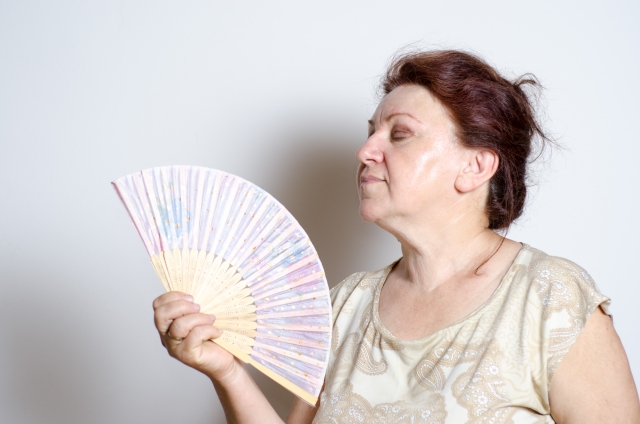When a woman is experiencing hot flashes, it can be all-consuming. She may not be able to think about anything else and yet, prevention and preparation are two of the most important strategies for dealing with this symptom of menopause. Small, important shifts can be implemented at any point in the day and may have positive effects on a woman’s experience with hot flashes. As each woman is unique, her body and menstruation included, it’s important to test various behavioral strategies to see what works individually.
Before Bed
If you tend to get hot flashes during sleep, you can make a few small adjustments to your sleeping routine to help improve the environment. Sleeping in a cold room, and drinking small sips of water before bed, have been studied to be effective. Some women also employ a bed fan, a simple cooling device, during sleep to help the body regulate its temperature. While preparing the bed for sleep, thinking about layers can also be helpful. Hot flashes are more frequently experienced as hot and sweaty in the moment, but after, the sweat produced can lead to chills and a drastic cooling of the body. Preparing for such changes in temperature can help your body regulate.
During the Day
Similarly, dressing with layers can be helpful for women who experience hot flashes during the day. A portable fan can also be used, as well as a spray bottle, potentially with an essential oil for cooling like peppermint oil. Some women find relief to symptoms by not drinking, smoking, consuming caffeine, or eating spicy food. Maintaining a healthy weight is important as well, as women who are overweightor obese have been found to have higher rates of hot flashes. Ultimately, finding ways to cut daily anxiety—through healthy practices, exercise, and diet—are all beneficial.
Herbal Remedies
There are behavioral and medical methods of treating hot flashes, but one of the in-between options includes herbal remedies. For generations, women have used herbs and tinctures to assist their bodies during menstruation, pregnancy, and menopause. Black cohosh and red clover have been anecdotally reported as reducing the symptoms of hot flashes, though studies haven’t had conclusive results. Traditional Chinese medicine has employed Dong Quai for thousands of years to help with gynecological problems, though it, like all herbal supplements, must be researched carefully. Women who have blood clotting problems, for instance, should not ingest Dong Quai. Ginseng, kava, and evening primrose have also been reported, and in various depth studied, for their effects on hot flash symptoms. If you are experiencing hot flashes, you can also go the natural supplementalroute, based on ancient Japanese wisdom of fermented soybean, as you continue to learn about herbal remedies can be helpful in the promise.
Experiencing hot flashes during menopause is a big challenge for women’s health. If you want to cool down hot flashes naturally, then find natural relief for hot flashes, a Japanese formula by ® Juveriente.




